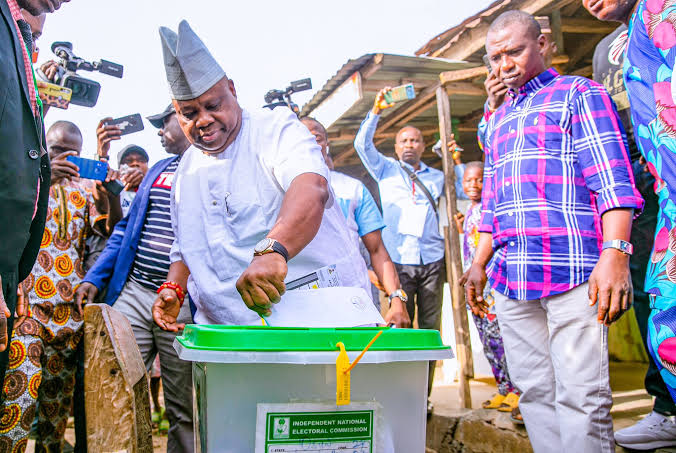Osun Decides: How PDP emerged victorious in 30 LGAs

Osun state governor, Ademola Adeleke. Photo Credit- Vanguard
The 2025 Osun State local government elections has become a hot topic amongst Nigerian political enthusiasts, marked by the Peoples Democratic Party (PDP) securing significant victories across the state’s 30 local government areas. This electoral outcome, however, has been accompanied by allegations of irregularities and legal disputes, prompting a critical examination of the factors contributing to the PDP’s success and the integrity of the electoral process.
Reasons why PDP won the election
Typical of Nigerian politics, where the political party of a sitting government is scarcely removed through election especially when it’s contesting a second term. Governor Ademola Adeleke in his administration, established after the 2022 gubernatorial election, provided PDP with a strategic position. The control over state resources and likely facilitated mobilization efforts and voter outreach, enhancing the party’s influence at the grassroots level.
Moreover the PDP demonstrated robust organizational capabilities, effectively coordinating campaigns and voter engagement initiatives. This organizational prowess likely translated into a more compelling presence in local communities, resonating with voters’ aspirations and concerns. In addition, the All Progressives Congress (APC) in Osun State has experienced internal divisions, leading to a weakened opposition front. This fragmentation may have reduced APC’s electoral strength, providing the PDP with a relative advantage in consolidating support.
READ ALSO
Osun PDP vs APC Crisis…see 5 major party power tussle that has claimed lives in Nigeria
Political parties: A special purpose vehicle for Nigerian politicians
Was the electoral process credible?
Despite the PDP’s electoral success, the elections were marred by reports of irregularities, casting doubts on the overall integrity of the process. Key issues that made the election highly controversial include: Legal controversies, before the dates of the elections, the Osun State High Court declared all 30 local government seats vacant due to previous electoral irregularities, mandating the Osun State Independent Electoral Commission (OSSIEC) to conduct fresh elections. This legal backdrop introduced complexities, with conflicting interpretations and directives from various judicial and governmental authorities.
Another thing, which seems to be a common experience in Nigerian elections across all levels is limited logistics, such as the absence of electoral officials and materials at several polling units, leading to delays and voters not been able to cast their votes. In some areas, elections commenced late or did not occur at all, showing that there still exist a limitation the credibility of the electoral process.
Additionally, opposition parties, like the Labour Party, alleged incidents of ballot stuffing and pre-thumb-printed ballot papers. These claims, if substantiated, point to deliberate attempts to manipulate the electoral outcome, contravening democratic principles. Furthermore, the withdrawal of observers by organizations like the Justice Development and Peace Makers Centre (JDPMC) due to security challenges and legal ambiguities further casts a shadow over the elections’ transparency and fairness. The absence of independent observers diminishes the accountability mechanisms essential for credible elections.
Conclusion
While the victory of Peoples Democratic Party in the 2025 Osun State local government elections can be attributed to strategic advantages and organizational strength, the immense number of reported irregularities raises critical concerns about the elections’ legitimacy. For democracy to continue to thrive in Osun State and Nigeria at large, it is necessary to address these challenges through broad electoral reforms, ensuring that future elections are done in a manner that shows compliance to transparency, fairness, and the rule of law.

